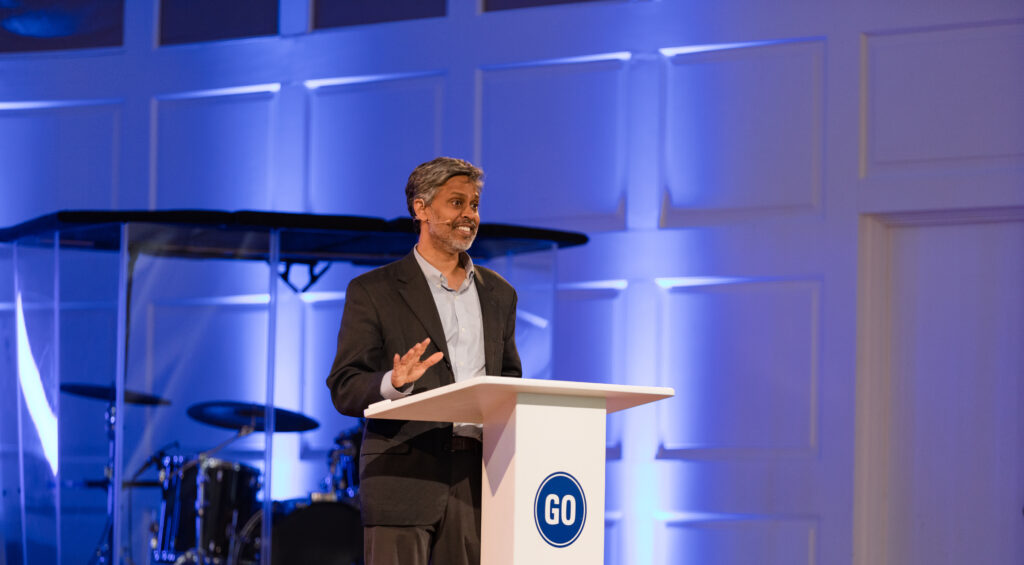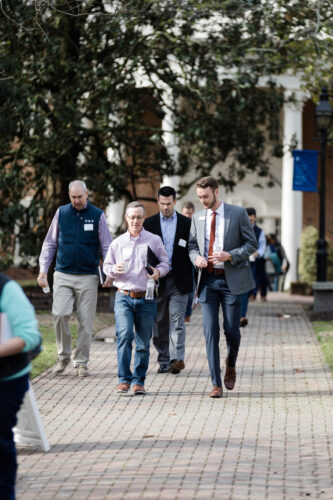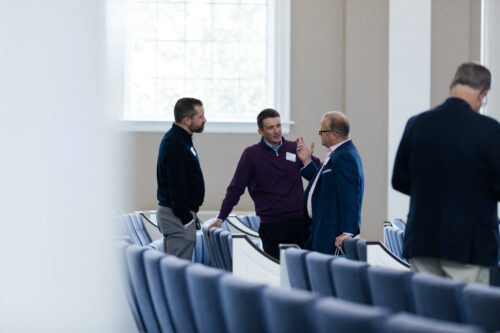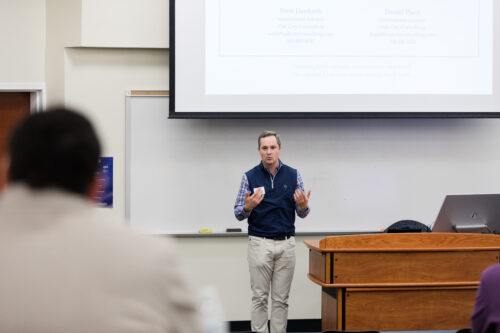Investing in God’s Kingdom: Southeastern Hosts the 2023 Faith at Work Conference
Chad Burchett | March 29, 2023

Southeastern Seminary hosted its third annual Faith at Work Conference this Wednesday, equipping attendees to think biblically and missionally about investing. The Faith at Work series offers students, alumni, and business leaders an opportunity to connect with one another and reflect on how they can leverage business and the workplace to make disciples.
“Southeastern is a Great Commission seminary, and it is our desire to not only leverage our faculty and resources to equip students but also partner with local churches and their lay leaders to equip all people to leverage their time, talent, and treasure for Christ and his kingdom,” shared Drew Davis, director of financial and alumni development at Southeastern.
It is our desire to … partner with local churches and their lay leaders to equip all people to leverage their time, talent, and treasure for Christ and his kingdom.
“This year we were grateful to have Dr. Finny Kuruvilla speak on how Christians can think well about their investments and how they can steward their resources to provide for their personal financial well-being while also strategically investing in businesses that promote human flourishing and the proliferation of the gospel across the globe,” added Davis.

With years of investing and healthcare experience, Finny Kuruvilla, co-chief investment officer of Eventide Asset Management, presented the keynote address on the power of investing to change the world. Surveying the influence of strategic investments throughout history, Kuruvilla demonstrated how investments can shape culture and change the course of history.
Charging Christian investors to steward responsibly their finances, Kuruvilla reminded attendees that Christians should care deeply about the resources God has given them because the Great Commission commands them to be involved in changing the world and calling all nations to submit to the lordship of Jesus Christ. This missional approach to investing requires Christians to not only share about their values but also allow their values to inform their investments.
Advocating for an intentional and collaborative approach to investing, Kuruvilla argued that Christians should invest in companies who practice integrity and whose values align with Christian values. Investors have power — power to invest according to their values, the power to change lives and confront evils, and the power to influence companies. As Kuruvilla reminded attendees, this powerful influence is a weighty responsibility.
“Companies shape our sensibilities; they shape us in ways that we can hardly understand,” noted Kuruvilla. “The power of business for good or for evil is tremendous. … It is an obligation of the Christian community not to turn a blind eye to evil practices but to use our dollars to end these kinds of practices.”
It is an obligation of the Christian community not to turn a blind eye to evil practices but to use our dollars to end these kinds of practices.

For Kuruvilla, investing toward the global common good is one way Christians can “fulfill the commands that Jesus has given us to love our neighbor as ourselves and to serve the global poor.” That is why learning to invest well as a Christian is such a timely and important task.
“The time is now to marry our faith to our work, to have a beautiful synthesis of these two domains in ways that please our King, that serve God, and that bring glory to the name of Jesus Christ,” shared Kuruvilla.
Following the keynote address, attendees could choose from three breakout sessions related to the integration of faith and finance. Sessions included
- “Redemptive Investing as a Strategy, Not an Asset Class” by Brett Danforth, director of client development for Oak City Consulting, and Daniel Ward, institutional advisor for Oak City Consulting
- “The Application of Religious Freedom in Investing” by Mike Kuckel, chief executive officer of Sovereign Financial Group and senior business fellow for the Religious Freedom Institute
- “A Brief Theology of Wealth and Poverty” by David Jones, professor of Christian ethics at Southeastern Seminary
Designed to help Christians think biblically, missionally, and strategically about their finances, the breakout sessions encouraged attendees to develop habits of faithful stewardship. “God is not as concerned with how much we possess, as he is with how we attain and how we steward our material condition,” Jones emphasized during his breakout session.
God is not as concerned with how much we possess, as he is with how we attain and how we steward our material condition.
Each year, the Faith at Work conference confronts Christians with an important question: How does the Christian faith intersect with business and enable Christians to engage the marketplace, biblically steward resources, and make disciples in the workplace?
 “Our faith in Christ should affect and inform every area of our lives,” commented Harry Nelson, director of strategic initiatives for Eventide, one of this year’s event sponsors. “Learning how to be a faithful Christian in the marketplace helps believers develop a healthy vision for applying the Great Commission and the cultural mandate. It is a gift to the Church for a seminary to offer solid, biblical content in an applied context. I’m grateful for Southeastern’s desire to equip business leaders as disciple makers in the workplace.”
“Our faith in Christ should affect and inform every area of our lives,” commented Harry Nelson, director of strategic initiatives for Eventide, one of this year’s event sponsors. “Learning how to be a faithful Christian in the marketplace helps believers develop a healthy vision for applying the Great Commission and the cultural mandate. It is a gift to the Church for a seminary to offer solid, biblical content in an applied context. I’m grateful for Southeastern’s desire to equip business leaders as disciple makers in the workplace.”
As a Great Commission seminary, Southeastern is committed to equipping Christians to serve the Church and fulfill the Great Commission in their neighborhoods, in the marketplace, and in every corner of the world. Through events like the Faith at Work conference, SEBTS is grateful to continue partnering with alumni, churches, and other organizations to advance God’s eternal kingdom.